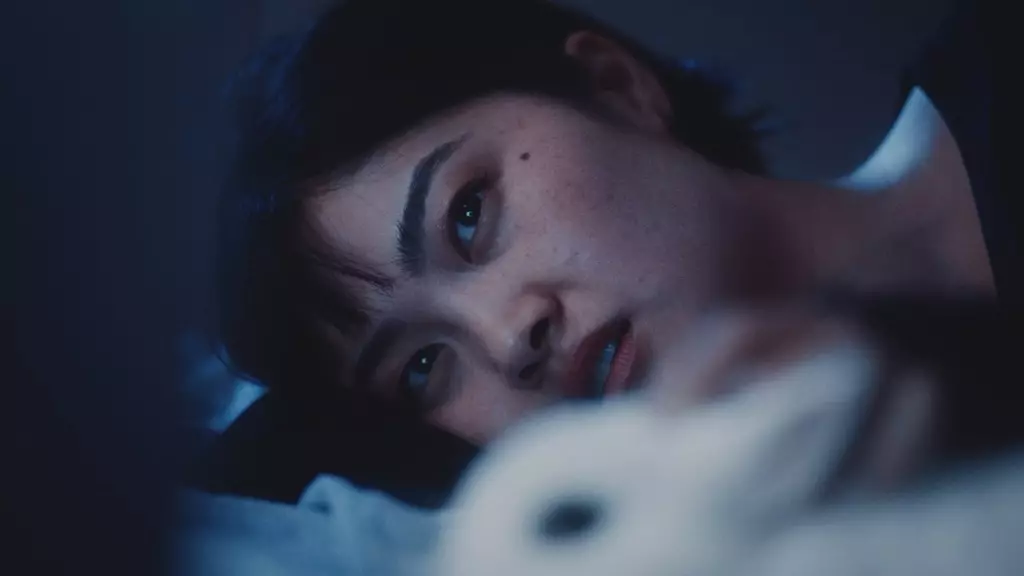Katarina Zhu’s feature film debut, “Bunnylovr,” serves as a poignant exploration of personal fulfillment against the backdrop of modern relationships, particularly those influenced by digital interactions and societal norms surrounding identity. Zhu not only takes on the role of director but also stars as the central character, Becca—a 20-something Chinese American navigating the complexities of life in New York City while simultaneously working as a cam girl. This unique setup allows the film to delve into multifaceted themes such as privilege, self-love, and the intricacies of ‘daddy issues’ in a contemporary context.
At the heart of “Bunnylovr” lies Becca’s struggle to find her identity amidst the various relationships that shape her existence. Zhu’s portrayal of Becca effectively captures the feelings of conflict and confusion that often arise in the pursuit of personal happiness. As a cam girl, Becca is not just a performer; she is constantly engaging in a digital dance where her reality is blurred by her role as an object of desire. The introduction of Milk, a rabbit gifted by a recurring client, serves as a pivotal turning point in Becca’s journey towards self-discovery. Initially hesitant to accept the rabbit, Becca’s eventual attachment signifies a critical shift away from her objectification towards a more nurturing, self-loving aspect of her personality.
The Complexity of Relationships
The film’s portrayal of relationships around Becca is starkly illuminating. Her interactions with various characters—her estranged father William, her self-absorbed best friend Bella, an ambiguous ex-boyfriend Carter, and the exploitative client John—paint a vivid picture of how every individual in her life contributes to her sense of self-worth, which is often filtered through their perceptions of her. William, portrayed by Perry Yung, embodies the father figure that Becca struggles to reconcile with, while Bella, played by Rachel Sennott, oscillates between supportive friend and narcissistic artist, raising questions about the true nature of friendship and artistic expression. The dynamic exposes an often-ignored reality: relationships can be both a source of comfort and a breeding ground for toxicity.
John, played by Austin Amelio, becomes particularly emblematic of modern male interactions in online settings. As a cam client, he fluctuates between providing financial stability and embodying a power imbalance that resonates with many narratives surrounding intimacy in the digital age. Becca’s evolving feelings towards John—ranging from aversion to comfort—reflect a complicated truth about dependency and emotional manipulation, making it clear that physical and emotional exploitation can easily coexist.
The rabbit Milk is not just a pet; it symbolizes Becca’s burgeoning sense of agency and self-care. The journey from reluctance to fondness illustrates Becca’s path toward taking control over her own life. As Becca begins to care for Milk, she simultaneously learns to prioritize her own needs over the constant demands of others. This shift from being a passive entity subjected to external desires to an active participant in her own life represents a critical theme of the film: the importance of self-acceptance and care in a world rife with expectations and obligations.
Ultimately, “Bunnylovr” serves as a cathartic experience, inviting audiences to examine not just Becca’s individual journey but their own interactions in an oftentimes isolating digital landscape. Zhu’s personal influences shine through, and as we witness Becca’s progress from a people-pleaser to a more mindful individual, viewers are also prompted to reflect on their own relationships and the ways in which they seek meaningful connections—whether they exist in the tangible world or the virtual one.
Through its layers of humor, warmth, and vulnerability, “Bunnylovr” proves to be much more than a narrative about a cam girl; it is a heartfelt commentary on the nature of connection in an increasingly disconnected society. The film encourages a deeper understanding of the roles we play in our lives and how we can embrace ourselves amid the chaos of others’ expectations. With “Bunnylovr,” Zhu not only paves the way for a future in film but also invites audiences to find the balance between self-discovery and the pursuit of genuine connection.

